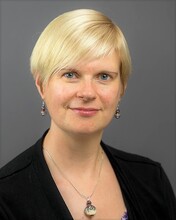
Lindsay Herron - Featured Speaker @ KOTESOL 2023
![]() Featured Session
Featured Session
Collaborating on Cross-Cultural Connections: Promise, Pitfalls, and Cosmopolitan Potential
In an increasingly interconnected world seemingly rife with xenophobia, prejudice, and division, there is a clear need to cultivate compassionate, reflective, open-minded orientations in students. One way to do so might be via cross-cultural connections – to facilitate interaction between our students and diverse others so everyone involved can encounter a variety of perspectives and uncover “new vistas for investigation and self-discovery” (Campano, 2007, p. 19), opening up new horizons, new possibilities, and the kind of “embodied cosmopolitanism” brought about by “wonder, triggered by substantive encounters with the new” (Hansen, 2014, p. 9).
It can thus be quite beneficial for educators to team up global peers to create a cosmopolitan “third space” (Gutiérrez, 2008) where their students can interact with each other. Indeed, this kind of collaboration between classrooms can be a powerful and motivating approach to education – but it comes with potential pitfalls, as well. Having collaborated with educators around the world on online intercultural exchanges, I’ll offer in this presentation a dissection of my own experiences: the highlights, joys, and benefits, as well as the problems, drawbacks, and disappointments. The presentation will conclude with advice and suggestions for collaborating with international colleagues on online intercultural exchanges, with the ultimate aim of crafting an enjoyable, positive, uplifting experience for everyone.
- Campano, G. (2007). Immigrant students and literacy: Reading, writing, and remembering. Teachers College Press.
- Gutiérrez, K. D. (2008). Developing a sociocritical literacy in the third space. Reading Research Quarterly, 43(2), 148–164. https://doi.org/10.1598/RRQ.43.2.3
- Hansen, D. T. (2014). Cosmopolitanism as cultural creativity: New modes of educational practice in globalizing times. Curriculum Inquiry, 44(1), 1–14. https://doi.org/10.1111/curi.12039
 Biosketch
Biosketch
Lindsay Herron has been a visiting professor at Gwangju National University of Education in Korea since 2008; prior to that, she was a Fulbright English teaching assistant at a boys’ high school in Jeju-do, Korea. Lindsay is completing a doctorate in literacy, culture, and language education (LCLE) at Indiana University (USA). In addition, she has an MSEd in LCLE; an MA in cinema studies; bachelor’s degrees in English literature and psychology; a postgraduate certificate in learning sciences, media, and technology; a CELTA; and the CELTA YL Extension. Her research focuses on the multimodal interactions and critical cosmopolitan literacies of language learners participating in an online cross-cultural exchange. Lindsay is also the current president of KOTESOL.
Select Site
The Cosmopolitan Classroom: Transformation Through Encounters with Difference
![]() Return to Conference Speakers page.
Return to Conference Speakers page.



